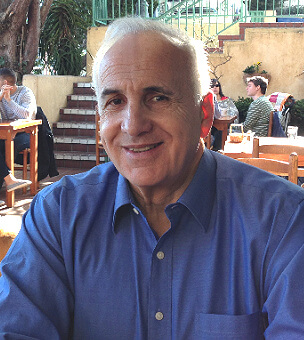928. A Day in the Life: What's It Really Like to Be a Theoretical Physicist?
Tom Banks

“The students I’ve enjoyed most are the ones who are clearly smarter than I am. Every once in a while you get these amazing students, sometimes a group of amazing students, who just blow you away and say ‘No, professor, that’s not right.’ And they’re right. And you’re wrong. That’s the biggest pleasure in the world.”
Professor Tom Banks grew up in Brooklyn NY and has lived in OR, MA, CA, NJ, GA and Israel. He was determined to be a theoretical physicist since high school and is a founding member of the New High Energy Theory Center at Rutgers, a Fellow of the American Physical Society and a member of the American Academy of Arts and Sciences. He works in particle physics, cosmology, condensed matter physics and the attempt to quantize Einstein’s theory of gravity. He’s still active in research at the age of 71.
The Most Impactful Turning Point?
“An important event in my life was that in my junior year of high school my father went on sabbatical to Israel. I went to high school in Israel for a year and their math curriculum was much more advanced than ours. So I learned a lot of math in high school that I would not have learned, even though I was going to one of the best high schools in New York City. I would not have learned that if I had just stayed at home.
“And the other thing that I did at that point in time turned out to be significant in the long run. There was a famous series of books on elementary college physics written by Richard Feynman, a famous, theoretical physicist from Caltech. These books were used at Caltech and then everybody got a hold of them. I got a hold of them as a high school student and started trying to read them on my own. I learned a lot from that, even though it was quite difficult doing it by yourself. It was not the easiest way to learn things, but it worked out well in the long term.”
The Most Powerful Lessons and Experiences?
1. “My father was a professor of chemistry, my mother a biology major who became a teacher. We were always talking about science around the house and it was clear early on that I was going to become a scientist of some kind.”
2. “While Reed College in Portland, Oregon, is a small liberal arts college and not especially prestigious, there were a few talented physics professors that took me to another level of understanding and experience. My four years at Reed as an undergraduate, coupled with the strong influence my dad had on me as a professor, solidified my vision to follow that same career path.”
3. “I had an equally positive experience doing my graduate work at MIT. Steven Weinberg, who later won the Nobel Prize, was one of many professors who had a strong, positive influence on my path to obtaining my doctorate in physics where my main interest was the study of particle physics.”
4. “As a full-time professor I spent half my time or more than that doing research. There’s teaching when you’re in front of the class and then, for every hour you’re in front of the class, you need to prepare for two or three hours. Research is a full-time job and full-time means I can wake up in the middle of the night and start scribbling on a piece of paper. I think I’ve had an idea that doesn’t always work out. Oftentimes my mind doesn’t really shut off. You have to consciously say to yourself, okay, I’m going to eat dinner and watch TV now. I’m NOT going to think about this problem any more. So, as I said, I spend a lot of time on research!”
5. “If you have an interest in the field of physics, the first thing you have to know is that you have to be really good in mathematics. So many of my friends in college were brilliant, but they just couldn’t do math to save their lives. They were social science majors or literature or psychology majors, that kind of thing. It was amazing to me that they were so smart, but they just couldn’t do math. And if you’re not good at that, don’t think about going into physics, particularly theoretical physics. That’s the first thing. And then what you should do is look around, as you said, there are all sorts of resources now on the internet. You can see lectures by people you know, public lectures and also more technical lectures are now broadcast regularly.”
On His Bookshelf
Elementary Particles and the Laws of Physics: The 1986 Dirac Memorial Lectures, by Richard P. Feynman and Steven Weinberg
Connecting With Tom Banks
Email: tibanks@ucsc.edu
Subscribe to the Podcast Free:
Careers: Professor, Researcher, Teaching/University, Theoretical Physicist


